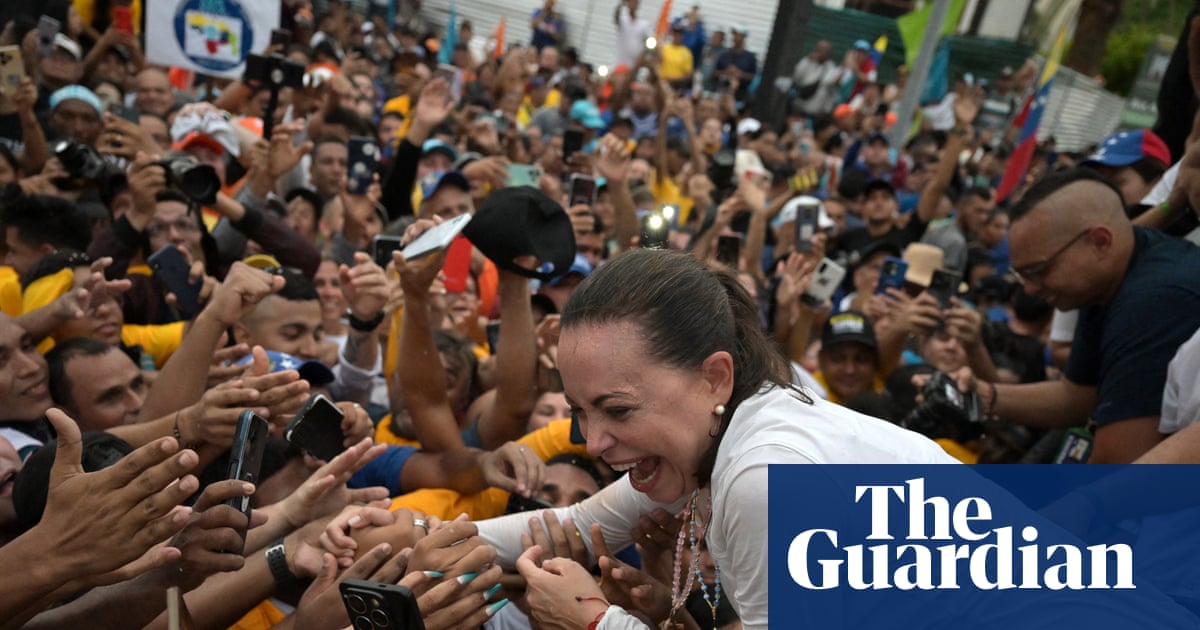María Corina Machado’s Nobel award puts focus on country but analysts doubt it will produce democratic change
In March 2019 as a nationwide blackout plunged Venezuela into darkness, hundreds of citizens huddled on a basketball court in the city of Maracaibo to hear their leader promise to guide them out of the gloom.
“We are, quite literally, living through our darkest hour. But these are also the brightest of times,” María Corina Machado told supporters as they used mobile phones to illuminate the night.
Six and a half years later, on Friday Machado used almost identical words to celebrate winning the Nobel peace prize for her “extraordinary” – yet incomplete – struggle against Venezuela’s “brutal, authoritarian state” under the president, Nicolás Maduro.
“We are … living the darkest hours. But at the same time there is enormous hope,” Machado declared after hearing the news, before vowing: “Venezuela will be free.”
For all Machado’s relentless optimism, one question lingered after Friday’s surprise announcement in Oslo: this time, was she right? Would receiving the prestigious prize advance Machado’s tenacious campaign to unseat Maduro, or could it backfire and lead to greater repression from the autocrat’s feared security forces?
International supporters voiced confidence that political change was coming for a country that has slipped into authoritarianism and economic malfunction since Maduro succeeded Hugo Chávez in 2013, with about 8 million citizens fleeing abroad. “The thirst for democracy always prevails,” wrote the European Commission president, Ursula von der Leyen.
Carlos Lizarralde, the author of a book about Venezuela’s collapse, said the prize would boost Machado by “cementing her position in the eyes of the international community … as the one credible opposition leader” in the South American country.
“A Nobel laureate, in many ways, is the secular equivalent of a living saint. This perfectly complements her quasi-religious public image,” Lizarralde said of Machado, a devout Catholic who before going into hiding after last year’s rigged presidential election attended rallies clutching a rosary and wearing crosses around her neck.
Others are more sceptical. David Smilde, a Tulane University Venezuela expert, said the prize would “definitely draw more international attention to the Venezuelan conflict and perhaps [create] more resolve” to end it.
“But judging by past Nobel winners, it will not be fundamental,” Smilde added, noting how the 1994 prize shared by Yasser Arafat, Shimon Peres and Yitzhak Rabin did not fundamentally reconfigure the interests and forces involved in the Middle East conflict.
Ronald Krebs, a political scientist who has studied the impact of Nobel peace prizes awarded in the hope of promoting political change in authoritarian countries, said his research showed they rarely succeeded.
Krebs cited Liu Xiaobo, the Chinese poet and activist who received the prize in 2010 while in prison – a decision Beijing called an “anti-China farce”. Liu died seven years later, still in custody and with his homeland having become an even more repressive one-party state under its Communist party leader, Xi Jinping.
In 2003, the Iranian activist Shirin Ebadi was honoured for her struggle for democracy and human rights. Krebs said becoming a laureate “insulated” Ebadi from persecution since Tehran feared jailing such a high-profile figure. “But it did absolutely nothing for those who were not similarly protected … if anything they were further repressed because of the Nobel peace prize,” he said.
Krebs said peace prizes could inspire human rights defenders “to come forward with greater vigour”. “[But] at the same time it gives the repressive regime even more incentive to repress those who would seek to effect change. [So] it creates a really problematic and worrisome dynamic that … ultimately works to the detriment of those who are advocating for domestic political change … The road to hell is paved with good intentions.”
Allies hope Machado’s prize will “bulletproof” her against regime reprisals. But Krebs said it was “extraordinarily doubtful” it would produce democratic change.
Andrés Izarra, a former minister for Maduro’s mentor Chávez, was also doubtful, although he said Venezuela’s authoritarian president was facing the greatest challenge of his 12-year reign.
Internationally isolated after being accused of stealing last year’s election from Machado’s ally Edmundo González, Maduro is also facing an unprecedented US pressure campaign that many suspect is aimed at forcing regime change.
Since August, Donald Trump has ordered a major naval buildup off Venezuela’s Caribbean coast, with a series of deadly strikes on alleged Venezuelan drug smuggling boats. “There’s never been a clearer chance of displacing [Maduro] from power than now,” Izarra said.
But the ex-minister dismissed the idea that Trump’s pressure campaign would “break” Maduro’s regime by sparking a military revolt. Izarra also doubted Trump would invade. “What you have in the Caribbean is a regime change operation … but it’s a performative one,” he said, designed to coerce Maduro into making concessions during secret talks Izarra believes are happening between US and Venezuelan officials.
“This is all going to resolve itself at the negotiating table,” Izarra predicted. Maduro and his allies were “never going to surrender power voluntarily” but equally Trump would never alienate his anti-intervention Maga movement by putting boots on the ground. “They don’t want forever wars. They don’t want Vietnam. They don’t want Iraq,” Izarra said.
Perhaps the only certainty is that Machado, a famously stubborn Margaret Thatcher-admiring conservative known as Venezuela’s “Iron Lady”, is unlikely to turn.
“She’s a true fighter,” said Lizarralde, predicting Machado would battle on. “In her mind, this is an epic struggle between good and evil … and she [is convinced she] represents good.”
Source: www.theguardian.com
